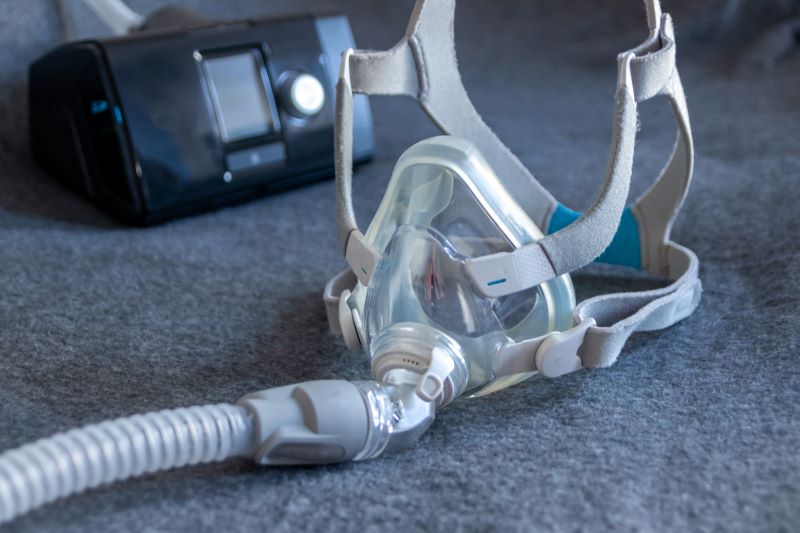Your Guide to CPAP Machines

It is estimated that between 10% and 30% of adults in the US have obstructive sleep apnea, a sleep disorder that causes repeated pauses in breathing during sleep. One of the most common ways of treating sleep apnea is continuous positive airway pressure (CPAP) therapy. If you need CPAP therapy, it is helpful to know how a CPAP machine works, how it can help a person with sleep-related breathing problems, and how to troubleshoot some issues that may occur when using a CPAP machine.
What is a CPAP Machine?
A CPAP machine is a medical device that uses a stream of pressurized air to keep a patient’s airways open, encouraging stable breathing while asleep. The air pressurized in the CPAP machine is pumped through a hose into a mask worn on the face.
Components of a CPAP Machine
There are many different brands and models, but all CPAP devices have these standard components.
- Machine – it includes the motor that generates streams of pressurized air and controls for operating the device.
- Hose – it’s a long tube connected to the CPAP machine and carries air to the mask.
- Mask – it delivers pressurized air into the nose and mouth in a way that holds the airway open. There are different CPAP mask styles. All masks include straps to keep them in place.
- Air Filter – it filters the air from the CPAP machine.
- Humidifier – most CPAP devices have a heated humidifier using water from an attached reservoir to add moisture to the airflow. The humidifier reduces discomfort from dryness in the nose caused by the pressurized air.
Types of CPAP Masks
Before using CPAP therapy, a sleep specialist or doctor will help you select a mask. The different types include:
- Nasal mask – only covers the nose.
- Oronasal mask – goes over the mouth and nose, covering an area from the bridge of the nose to the bottom of the mouth.
- Nasal pillows – instead of going over the nose, this mask sits under the nose and above the upper lip. Some types have prongs fitting into each nostril.
- Oral mask – covers the mouth only.
- Full-Face mask – covers most of the face. This type is rarely used.
Mask Fit
A CPAP mask has to fit correctly against the face to ensure no air leaks. In addition, the mask must be comfortable enough to be used night after night. Different straps and cushions are available to help keep the mask in place, making it comfortable to wear. The best CPAP mask offers a combination of comfort and performance.
Benefits of CPAP Machines
Regular use of CPAP therapy may resolve or reduce obstructive sleep apnea symptoms, improving sleep and a patient’s quality of life. Some of the benefits that might come from the use of CPAP include:
- Reduced snoring
- Consistent breathing during sleep
- Reduced daytime sleepiness
- Improved thinking and focus
- Healthier blood pressure
- Improved quality of sleep for a bed partner
- Few mornings headaches
- Enhanced mood
Side Effects of CPAP Machines
For most people, it is challenging to get accustomed to sleeping with a CPAP machine. It takes weeks or days to get used to the machine through the night. Some side effects of using CPAP machines include:
- Dry mouth
- Discomfort from the mask and stream of pressurized air
- Nasal congestion
- Eye and skin irritation
- Anxiety or claustrophobia when wearing the mask
- Chest muscle discomfort
In most cases, adjustments to CPAP settings might resolve these side effects making nightly CPAP use even more comfortable.
Tips for Using CPAP Machines
Here are tips to help make the adjustment process smoother when using a CPAP machine.
- Research – seek quality information to resolve the most common questions about using a CPAP machine.
- Work with a specialist – keep in touch with the healthcare team when you start using the CPAP machine to help resolve any challenges. For example, a specialist might suggest modifying the mask or trying a different one.
- Patience – the CPAP mask or airflow might initially make sleeping hard or uncomfortable. It is usual for it to take time to adjust using the machine. Despite the difficulties, using the CPAP machine for an entire night might speed up the acclimation process.
CPAP Cleaning and Maintenance
CPAP devices come with specific instructions for maintenance and cleaning. It is vital to follow these directions and any guidance a specialist gives. For example, some parts of the machine, such as the mask, might need cleaning daily, while others require thorough cleaning and disinfection weekly.
Watch for wear and tear of the CPAP components and replace them when necessary. Masks, hoses, and straps should be periodically replaced based on the instructions from the manufacturer. If the material on these items becomes noticeably dirty or damaged, they should be discarded.
Parkway Sleep Health Center
Do you struggle with a sleep disorder? Parkway Sleep Health Center can help. After a thorough evaluation, our team can recommend a treatment plan, including a CPAP machine, if necessary. So, if you need a CPAP machine in Cary NC, we’re ready to help. Contact us at 919-439-3463 and schedule an appointment today.



